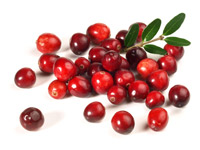
Cranberry extracts have been proven to be antibacterial against both Staph and MRSA bacteria.
Here’s some “new” news for cranberries. While it’s been long known and well documented that cranberry juice helps soothe and control bladder infections, a recent study published in 2012 shows cranberry extracts inhibited the growth of multiple species of Staph bacteria, including MRSA.
On top of that, the cranberry extracts also showed activity against Staph and MRSA biofilms, which are one reason why Staph and MRSA bladder infections can be difficult to eradicate.
While the majority of bladder infections are caused by E. coli bacteria, more people are now getting MRSA in their bladder or urinary tract. While most MRSA bladder infections are caused by using catheters which introduce the bacteria into the urethra and bladder, many are are not catheter related. One reason MRSA bacteria are so tough to get rid of is because they clump together, attach to your body (in this case they attach to the bladder or other part of the urinary tract) and they form a protective covering called a “biofilm“.
Cranberries contain antioxidants called “proanthocyanidins” or PACs which are thought to prevent bacteria from adhering to tissues or surfaces. While antibiotics are the main choice for conventional infection treatment and care, antibiotics do not work well against biofilms as a primary therapy. Many herbal and natural remedies do fight against biofilms, and now it appears cranberry extracts can be added to the list.
Study Outline
Bacteria tested against three different PAC-standardized cranberry extracts:
E. coli
Staph epidermidis
Staph aureus
MRSA (methicillin resistant staph aureus)
Staph saprophyticus
Study Results
The PAC-cranberry extracts inhibited both the growth and biofilm production of all of the Staph species, including MRSA. Interestingly, the extracts did not inhibit E.coli. The study also notes the cranberry extract only inhibited the Staph and MRSA biofilms, it did not eradicate them.
Summary
Adding cranberry extracts to your UTI or bladder infection treatment may help you get over your infection quicker and it may help make your treatment more effective. Because it’s also inhibitory of biofilms, using the extracts may also help prevent against infection. I would avoid cranberry juice, unless it’s unsweetened juice, as sugary drinks and foods will feed infections. I’ve covered more details on treatment options for MRSA UTIs here.

- Symptoms, risks and more: MRSA and Staph urinary tract infections
- What your Doctor may not tell you about MRSA and Staph
- Natural and alternative therapies for MRSA and Staph infections
References
Effects of cranberry extracts on growth and biofilm production of Escherichia coli and Staphylococcus species. LaPlante KL, Sarkisian SA, Woodmansee S, Rowley DC, Seeram NP. Phytother Res. 2012 Sep;26(9):1371-4. https://www.ncbi.nlm.nih.gov/pubmed/22294419




